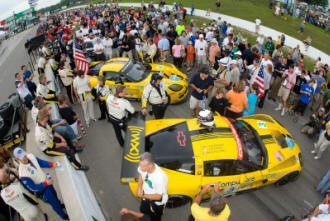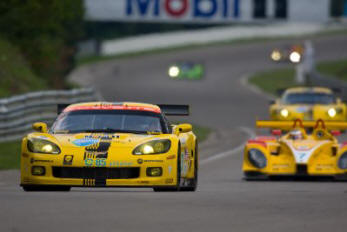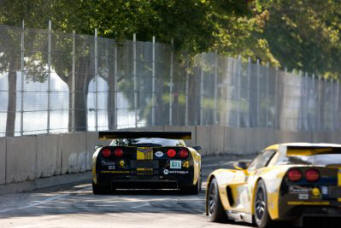 DETROIT,
Sept. 9, 2008 - Steve Wesoloski, GM Racing Road Racing Group
manager, and Doug Fehan, Corvette Racing program manager,
participated in a media teleconference today to outline Corvette
Racing's plans for the 2009 and 2010 seasons.
DETROIT,
Sept. 9, 2008 - Steve Wesoloski, GM Racing Road Racing Group
manager, and Doug Fehan, Corvette Racing program manager,
participated in a media teleconference today to outline Corvette
Racing's plans for the 2009 and 2010 seasons.
It was announced that
Corvette Racing will run a limited schedule in the GT1 class in
the first half of the 2009 American Le Mans Series season as it
prepares for its 10th participation in the 24 Hours of Le Mans
in June. The team will race in the ALMS GT1 class in Sebring and
Long Beach. Following its return from Le Mans, Corvette Racing
will compete in the GT2 category in selected ALMS events in 2009
in preparation for a full-season program under new international
GT class regulations in 2010.
The following is a
transcript of the teleconference.
Steve Wesoloski: "Thanks
for joining us today. I'm excited to announce some news
regarding Corvette Racing in the future and hopefully put some
rumors and speculation to rest. At this time we are announcing
our plans for 2009 and 2010. In 2009 we are going to start the
season with our current GT1 cars and race Sebring, Long Beach,
and then go the pinnacle of our program, Le Mans, to try for our
sixth victory in 10 races with the GT1 cars. Coming back for the
second half of the season, we will be racing selected races with
an all-new GT2-spec Corvette race car.
"We will hopefully see the
level of competition that the GT2 class currently has, and we
want to join in that fray with other marques that we compete
with in the marketplace, such as Porsche, Ferrari, and BMW.
Going into 2010, our intent is to go forward with our full
factory effort for the championship in the new GT class. The
rules will be converging on a single class for 2010. We've been
staying abreast with the FIA and ACO, and we have confidence
that this new class will be just as exciting while still
remaining relevant to the marketplace and relevant to our street
car. We intend to continue Corvette's history, taking our
current team and technology we've developed and applying it to
an all-new car per the rules for 2010.
"We look forward to
competing, and that is the main reason for moving in this
direction. We want to go where the competition is. We see this
class has a lot of potential growth, and it's going to be very
exciting for years to come.
"As part of the
requirement of the rules, we will eventually be developing
customer cars. We have a lot of interest, as you can imagine,
from people around the globe wanting to buy a Corvette and go
head-to-head with Ferrari, Porsche, Aston Martin, BMW and
others.
"I'll turn it over to Doug
Fehan to go into some of the details on what we will be building
and competing with next year."
Doug Fehan: "Thank you,
Steve. I think it's pretty clear to everyone who follows the
series that although we have been very successful in the last
couple of years with our marketing programs, eventually we were
going to need to get some competition. I think that globally
that was recognized by both the ACO and FIA, and I think that
was the precursor to the new GT rules and regulations using 2010
as the fulcrum to kick everything off.
"We're pretty excited
about this, obviously, because we do want somebody to race
against. In the current GT configuration as it exists out there
with Ferrari, Porsche, and clearly BMW coming, and rumors of
Audi, it looks like the place we need to be. It's relevant to
our product.
 "The
C6.R will continue its legacy that began in GT1. That's our
goal, that's our objective. It's going to be a difficult road.
When you look at some of the race tracks where we race already,
the GT2s are within a couple of ticks of where the GT1 cars are.
We're going into this with our eyes wide open. We know the level
of performance that exists out there, and we're certainly
embracing that challenge and looking forward to it.
"The
C6.R will continue its legacy that began in GT1. That's our
goal, that's our objective. It's going to be a difficult road.
When you look at some of the race tracks where we race already,
the GT2s are within a couple of ticks of where the GT1 cars are.
We're going into this with our eyes wide open. We know the level
of performance that exists out there, and we're certainly
embracing that challenge and looking forward to it.
"In addition, we are going
to continue our commitment in racing with E85 cellulosic ethanol
in our new GT effort. Initially we are going to start with a
6-liter version of the engine we're running now, the LS7
small-block.
Obviously the rules change
in 2010, so we'll be developing a 5.5-liter version of the
latest GM small-block V-8. That will be in compliance with FIA,
and as Steve said, we'll have cars available to customers.
"It's exciting. It's a new
chapter in Corvette Racing. We welcome the competition, and
we're looking forward to what the future holds for us.
"That concludes my
remarks, and now we'll open it up to questions."
This will be an all-new
car constructed by Pratt & Miller, is that correct?
Wesoloski: "Yes, that's
correct."
Are there any differences
you can mention that won't reveal your competitive position?
Fehan: "First and
foremost, the new car will be utilizing an aluminum chassis.
We'll be integrating some rather advanced technologies in that
chassis. We'll be integrating a steel roll cage into the
aluminum chassis.
By integration I don't
mean glued or bolted, as exists in the current aluminum chassis.
We actually have a welding technology we've worked on with
suppliers where we utilize friction welding techniques. We'll
have details on that as we announce the car. It's pretty
exciting stuff, and we're excited to be the first to employ it.
Once again, the implementation of technology in the race car
precedes the production car. It's all part of our story and the
exciting legacy of Corvette."
Wesoloski: "The key is
that the new GT rules are very much based on today's
GT2 cars, so there will be
a lot more production content, a lot more requirement to stick
closer to what the cars are on the road. Any substitutions have
to come from another large volume GM product, so we'll be
sticking a lot closer to production and you'll be seeing a lot
more of that content."
Are the 2010 rules going
to be another dramatic step, or not that dramatic?
Fehan: "It shouldn't be
that dramatic. Those rules are being worked on right now. We've
seen some rough drafts of them. They will be very similar to
what we will be building for 2009."
Can you tell us what role
Ron Fellows will be playing in the future with Corvette Racing
as you get into this new technology and the new rules?
 Fehan:
"We have a tremendous fan base in Canada, and obviously Ron
plays a key role in that as witnessed by his successive runs as
the most popular driver in the series. In all fairness to
everybody here, we don't talk about drivers or their involvement
until the final race of the year. Ron has obviously been a key
figure since the very inception, and continues to play a very,
very important role this year, and we'll have to leave it at
that."
Fehan:
"We have a tremendous fan base in Canada, and obviously Ron
plays a key role in that as witnessed by his successive runs as
the most popular driver in the series. In all fairness to
everybody here, we don't talk about drivers or their involvement
until the final race of the year. Ron has obviously been a key
figure since the very inception, and continues to play a very,
very important role this year, and we'll have to leave it at
that."
I'm aware that you have
been with Katech and CRD on the GT2 project until now, will they
continue to do development for you, and who's on top on that?
Wesoloski: "We have not
determined where we will be building the engines right now.
We're working within the GM Powertrain internals and they have a
lot of great expertise and technology. As it will be a much more
production-based engine, we're going to start with the
development there.
We'll be spending 2009
developing the proper package for 2010. An engine source has not
been determined at this time."
Fehan: "I think it's
important to add that throughout the life of the program, Katech
and Powertrain have worked together in various aspects to get
this done - essentially Powertrain being responsible for a lot
of the design work and Katech being responsible for a lot of the
assembly. So it's been a joint effort all along. As we go
forward with a new program and more customers, how that is all
delineated is still to be determined."
You will use their
assistance, will you not?
Wesoloski: "That's yet to
be determined."
I'm curious about
homologation of the new car, specifically related to the fact
there is a GT2 Corvette that Riley built that ran a portion of
this season. There is also a Dutch Corvette that ran the LMS
series last year as well. With a few different versions of
Corvette running in GT2, how is that going to be consolidated or
not, at least for next year?
Fehan: "As it exists right
now, in the eyes of the FIA, there isn't a Corvette homologated.
Ours will be the first and the only homologated car."
Any further development on
seeing a (Corvette) GT1 engine available for use in prototypes?
Fehan: "As we have said
all along, we continue to evaluate every road racing motorsports
opportunity that exists. To date no decision has been made
either way on that. The only thing we can confirm is that people
have come to us inquiring as to whether or not we have an
interest in that. That's something that we're still evaluating."
What were the main
determining factors for you just running Sebring, Long Beach,
and Le Mans? Why did you pick Long Beach out of the ALMS
schedule?
Wesoloski: "That was
largely a marketing decision, looking at a very important market
for Corvette in the Southern California region. Also it's a big
event for our primary sponsor, Compuware. Historically it's been
a big event from that aspect. Obviously trying to space things
out and give ourselves a little more time to prep for Le Mans
factored into it, but the main reason was from the marketing
aspect."
Is this car going to be in
the lead class for the World GT Championship, and is that
something that would be of interest to Corvette Racing?
Fehan: "The way the rules
appear to be going to be finalized - these are FIA rules we're
talking about now, not necessarily ACO or ALMS rules - the GT2
car as we'll call it for the time being will serve as the base
car. To get to a GT1, which will be developed off of GT2, right
now they're talking about a change in the bodywork, a larger
wing, and some different power.
That may be a slight
oversimplification, but I think you get the gist of what I'm
saying. GT1 is like a build-up from the GT2 car, so a guy who
had a GT2 car could, in fact, buy a kit from the manufacturer
and make it a GT1 car. I think that Stephane Ratel's objective
is to have GT1 cars run for that world championship program.
Manufacturers are certainly considering it, but the focus seems
to be on GT2 right now, and that's where our focus is going to
stay for the time being."
How similar are the 2010
GT rules to what we're seeing right now in the 2008 American Le
Mans Series?
Wesoloski: "They are very
close, but there are some slight modifications.
The ACO is interested in
slowing down all of the classes at Le Mans, so there will be
some further limitations on things like ride height and
aerodynamic devices on the cars. Largely they will be the same
chassis, with some restrictions on engine displacement that will
be eligible for each of the different GT classes. That's one of
the ways to differentiate power, by specifying engine
displacements that will be allowed to run in GT1 versus GT2."
Is the general consensus
that eventually there will be but one GT class?
Fehan: "I don't know that
that is necessarily anybody's given direction. Our speculation
is that by default that will probably occur. Right now ourselves
and the one Aston Martin are the only cars running (in ALMS
GT1). In the natural order of things, it's not something that
anyone is planning or forcing to have happen. I think it's just
been an evolution. If there's nobody there, there won't be a
GT1.

